Hannah Mills' golden voyage: From Cardiff reservoir to Olympic history maker
- Published
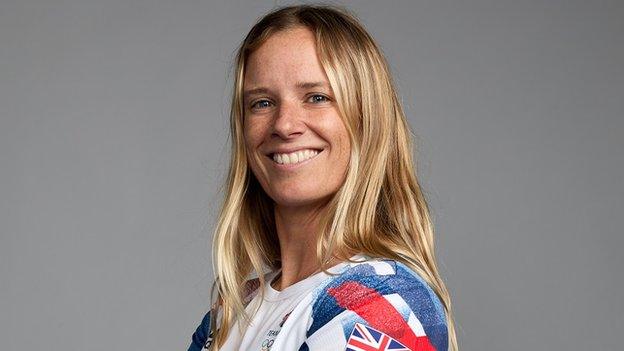
Hannah Mills is just the fifth Welsh woman in history to claim top spot on the Olympic podium
Hannah Mills always had confidence in her ability.
In 2002, when aged just 14, she met the then Secretary of State for Culture, Media and Sport Tessa Jowell, who was working on the bid to bring the Olympics to London.
The story goes when she was introduced, Mills declared if London won the bid, she would win sailing gold.
"I can't remember the exact conversation, but those words might have come out of my mouth. When you are younger, you always have this inner belief," Mills had previously explained.
Her prediction almost came true as she claimed a silver medal alongside Saskia Clark in the women's 470 class.
That Welsh teenager has instead fulfilled another accolade after becoming the most successful female sailor in Olympic history.
Four years after London, Mills won gold in Rio with Clarke and followed that triumph with this stunning success alongside Eilidh McIntyre in Tokyo.
"To become the most successful female sailor is insane," Mills, now 33, said as she celebrated the achievement.
"Growing up as a little girl, it's something I had in my mind that I wanted to do - first to win a gold medal and then to win the most."
Team GB sailors Mills and McIntyre win 470 gold
So Mills ticked off this incredible item on her bucket list as well as becoming Wales' most successful female Olympian and the first Welsh woman to win three medals at consecutive Games.
Italian sailor Alessandra Sensini won four medals with one gold, a silver and a pair of bronze medals, so perhaps she can still claim to be the most decorated.
Several sailors, including Britain's Shirley Robertson, Sarah Ayton and Sarah Webb, had claimed two gold medals but, until now, no female sailor had two gold medals and a silver.
Dutch Laser Radial sailor Marit Bouwmeester had also finished second at London 2012 before winning gold at Rio 2016, but only took bronze in Tokyo. It was left to Mills to become the record breaker.

It has been a long journey for the child from the Vale of Glamorgan village Dinas Powys, just outside Cardiff. She started sailing aged eight on a family holiday in Cornwall with parents Chris and Fiona, plus brothers Richard and Nick.
"It is random because nobody in my family has a history of sailing," she recalled.
"I was playing a lot of tennis, but started to experience knee problems. I got into sailing and just fell in love with the sport."
Mills started in little plastic dinghies on Llanishen reservoir, spending nights and weekends messing about in boats with friends.
She honed her craft at the Cardiff Sailing Centre, previously known as the Llanishen Sailing Centre, and the Cardiff Bay Yacht Club where her family and friends met up to celebrate her latest triumph.
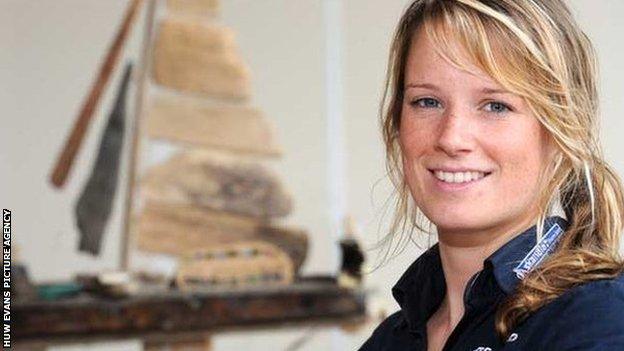
In 2002, Hannah Mills was voted UK Young Sailor of the Year and BBC Wales Young Sports Personality of the Year
Mills became involved with the Royal Yachting Association (RYA) youth and junior programmes in Optimists and, with help from her family, started racing around Wales.
She has always been thankful for that support, saying: "In this sport, you end up all over the country and your poor parents have to ferry you around which is demanding.
"It takes a lot of dedication to give up their time, so I will always be grateful to them."
Mills soon came to the attention of the Wales squad and rose through the Great Britain ranks. She won a series of British, European and world titles in a glittering junior career, competing as an individual and in crewed events.
The former pupil at Howell's School in Llandaff was the first Brit to win the Optimist Girls' World Championship in 2003, having been the first girl to win the British national title.
Mills was always considering whether her passion could become a vocation.
After completing two years of a mechanical engineering degree at Bristol University, she deferred the third year to concentrate on her Olympic goal in London, basing herself permanently at the British Sailing headquarters at Weymouth and Portland.
Helm Mills had been looking for someone to sail with in order to have a chance at competing at London 2012 and split from a previous crew partner after an 18-month association.
Tokyo Olympics: 'Surreal' feeling for Olympic record breaker Mills
The home Games had always been her aim, but she was in the wilderness to some extent. Then Clark came along.
Clark, partnering Christina Bassadone in the 470 class, had finished sixth at the 2008 Beijing Olympics sailing regatta. She was then set to sail at London with Sarah Ayton, only for Ayton to retire to focus on family life.
Clark needed a new partner quickly with the seeds of a link-up sown with Mills, nine years her junior, after a night out in a pub called the Lazy Lizard in Weymouth.
The chance was presented for Mills to team up with the more senior Clark, although it was less than 18 months before the Games, so there was not a lot of time to gel.

The chemistry was instant and the pair enjoyed immediate success on the water.
They won silver at the Hyeres World Cup event in April 2011 - their second regatta together - and sailed to victory in an Olympic test event on the London 2012 course in Weymouth.
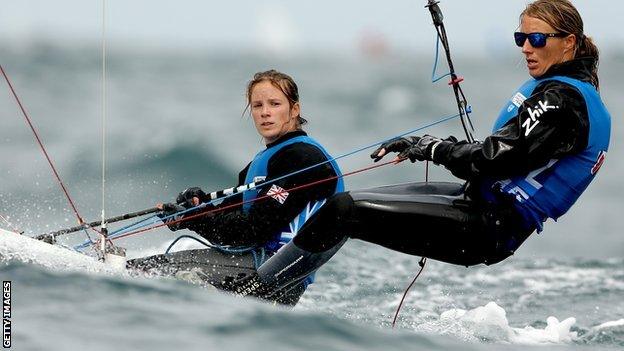
Saskia Clark and Hannah Mills won silver in the 470 class at London 2012
A silver medal followed at the 2011 World Championships in Perth, before a breakthrough global gold in that competition in Barcelona the following year.
Mills was among the first group of Team GB sports stars selected for London 2012, but there was further - and rather unlikely - headline news to come.
Just days after her official inclusion, American rapper Snoop Dogg congratulated her on his Twitter page, which at the time had more than five million followers.
Snoop also appeared on YouTube dressed in a Cardiff City shirt and said: "A big shout-out to Hannah Mills, a 23-year-old sailor who has just made it to the Olympics. What an achievement.
"I want you to go out there and break a record and win a gold medal."
Mills admitted at the time she was amused and bemused, recalling that: "It was nice, but bizarre.
"Nobody believed us and said we had faked it, but I am not sure how they thought we had faked Snoop Dogg wearing a Cardiff City shirt giving Hannah Mills a shout-out."

Mills and Clark entered London as reigning world champions and were sailing on home Weymouth waters, where they trained every day.
They headed into the medal race on the final day with gold in their sights.
Things quickly started going badly in the finale, however, and they ended the race second last as New Zealand's Jo Aleh and Olivia Powrie coasted to victory.
Though the British duo won silver, the delight of securing an Olympic medal was mixed with despair at missing a golden chance.
Even though there was pride at finishing on the podium in a home Games, a feeling of what might have been lingered.
There was a hangover after the 2012 Games, with the pair taking a break before deciding to give the Olympic cycle one more chance.
There were challenges. Clark had to overcome a nasty bout of pneumonia and the duo temporarily lost their coach, Joe Glanfield, who decided to return to competitive action himself before abandoning this dream and coming back to guide them.
When they reunited, Mills admitted they were going through the motions and, for a while, were in a negative spiral. Yet improvements were evident when they snapped out of the lethargy.
The pair won silver at the 2014 and 2015 Olympic test events in addition to further silver (2015) and bronze (2014) World Championship medals. They also claimed the World Cup win in Weymouth, where they exacted some revenge over their Kiwi rivals.

Clark and Mills made headlines out of the water in December 2014 when they were mugged at knifepoint in Rio during a training camp.
The duo were walking back to their hotel from the sailing base when two knife-wielding attackers pushed them and grabbed everything they had.
This did not stop the Brazilian city becoming Mills and Clark's second home for the 18 months before the Games.
To prepare for the challenging tidal conditions and unpredictable winds expected inside Guanabara Bay and on the outside ocean courses, each British sailor spent between 90-150 days in Rio between 2013 and 2016.
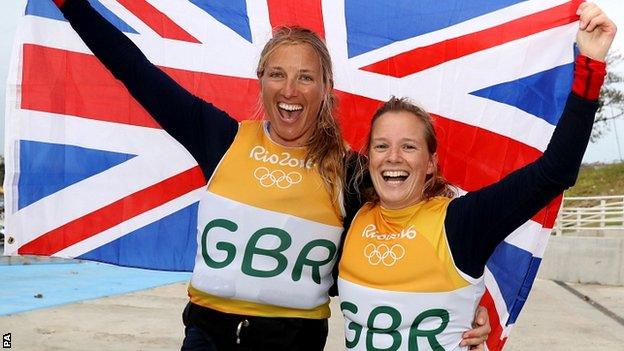
Saskia Clark and Hannah Mills won the World Championships in 2012 before Olympic success four years later
Mills and Clark dealt with stories of safety issues, the Zika virus and the sewage and dirty water on the sailing courses and simply focused on their golden goal.
The pair were confident coming into the competition and this was reflected in the Rio regatta, where they were the dominant force.
In the 10-race series, Mills and Clark held a 20-point lead heading into the medal race, which was initially delayed because of a lack of wind.
When they were crowned champions, there were emotional scenes as Mills' mother greeted them on the beach.
Their mission was complete. It was to be the last time Mills and Clark, who retired, raced together.

Having achieved her ultimate dream, Mills was unsure what to do post-Rio. She had the gold medal. What was left? Olympic history, it transpired.
An MBE followed, while Mills flirted with switching to the 49er FX and did some work experience at an activity clothing company as a "precaution" in case she did not carry on.
GB Olympian Hannah Mills launches plastic initiative
The early part of 2017 presented physical challenges, with Mills suffering concussion in January and stomach problems in March which required a gastroscopy.
There was also a "small brain bleed" and broken nose sustained before the start of the J/70 World Championships in Sardinia in September.
Mills also joined forces with McIntyre in 2017 and they have proved to be a formidable unit.
McIntyre was hoping to emulate her sailing father Michael, who won a gold medal in 1988, while Mills was now the senior partner, the steady older hand.
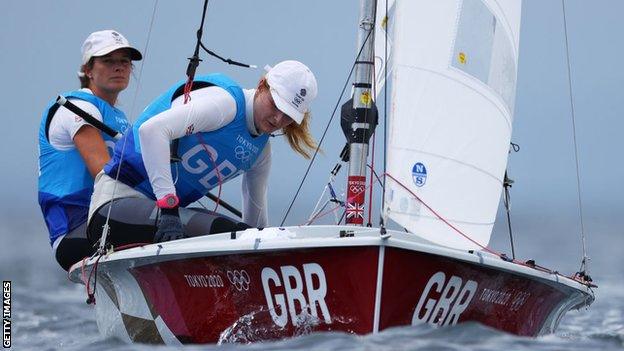
Hannah Mills and Eilidh McIntyre have found their own sailing chemistry
World Championship silver in 2017 was followed by a bronze a year later, before they were crowned global winners in 2019.
That came on the Enoshima Tokyo 2020 waters, where they also finished second at the Olympic test event.
Mills' last Olympic cycle allowed her to focus on other projects. She has set up the 'Big Plastic Pledge', which aims to eradicate single-use plastic in sports, and is an European Climate Pact Ambassador.
She is also a pioneer, as she was first of six British women to train with four-time Olympic gold medallist Sir Ben Ainslie's SailGP team as part of a new female development programme - an initiative to fast-track the inclusion of female athletes into the event, with one full-time position on his squad up for grabs.
Her standing among the British Sailing team and beyond is strong, with Mills handed the honour of being Team GB's flagbearer for the Tokyo opening ceremony alongside rower Moe Sbihi.
Mills has always concentrated on the Olympic prize - and the chance to make history - though she admitted the year delay caused by Covid-19 and uncertainty over the Games had been "draining".
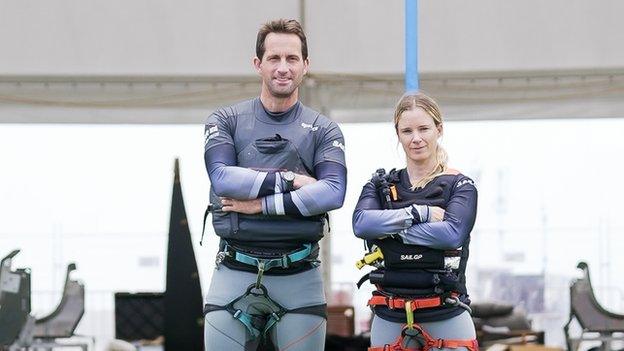
Four times Olympic gold medallist Sir Ben Ainslie and Hannah Mills were Great Britain team-mates at London 2012 and they sailed together in the opening event of SailGP Season 2 in Bermuda earlier this year
She revealed both her and McIntyre had been sick with nerves during competition week. That was not evident as they held a commanding lead after the 10 regular races.
The pair finished the job in style with a fifth-place finish in the medal race to claim a convincing overall victory and back up their world number one status.
They immediately celebrated, but had to wait after the French put in a protest which gave the Team GB pair some short-term distress. That was dismissed after a nervous wait.
A dramatic ending but just another chapter in the Hannah Mills story. This sailing pioneer had constantly maintained Tokyo would be her last Olympics with the 470 class becoming a mixed event in Paris in 2024.
That final decision has now come, leaving Mills and her family, friends and fans to celebrate a remarkable Olympic legacy.
This article was first published in August, 2021 after Mills won gold at the Tokyo Games.

'In my eyes, anyone can be an influencer': Is social media a viable full-time career at 16?
SCRUM V PODCAST: The latest rugby news and views
